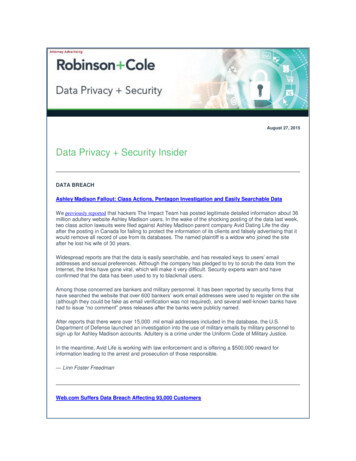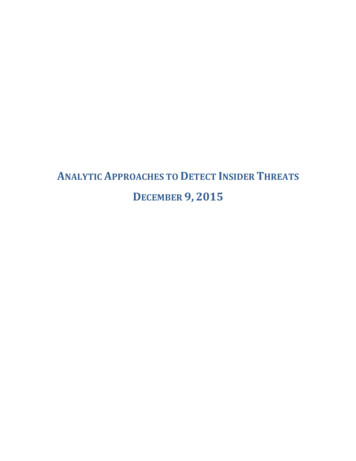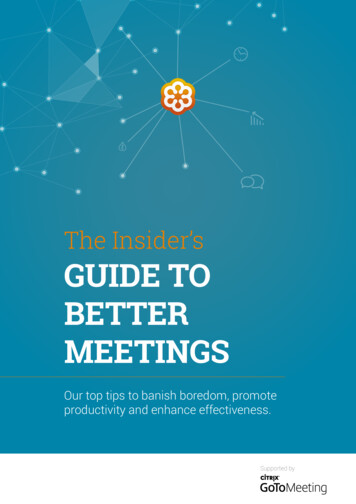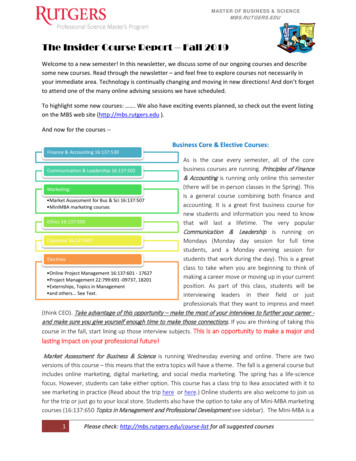
Transcription
August 27, 2015Data Privacy Security InsiderDATA BREACHAshley Madison Fallout: Class Actions, Pentagon Investigation and Easily Searchable DataWe previously reported that hackers The Impact Team has posted legitimate detailed information about 36million adultery website Ashley Madison users. In the wake of the shocking posting of the data last week,two class action lawsuits were filed against Ashley Madison parent company Avid Dating Life the dayafter the posting in Canada for failing to protect the information of its clients and falsely advertising that itwould remove all record of use from its databases. The named plaintiff is a widow who joined the siteafter he lost his wife of 30 years.Widespread reports are that the data is easily searchable, and has revealed keys to users’ emailaddresses and sexual preferences. Although the company has pledged to try to scrub the data from theInternet, the links have gone viral, which will make it very difficult. Security experts warn and haveconfirmed that the data has been used to try to blackmail users.Among those concerned are bankers and military personnel. It has been reported by security firms thathave searched the website that over 600 bankers’ work email addresses were used to register on the site(although they could be fake as email verification was not required), and several well-known banks havehad to issue “no comment” press releases after the banks were publicly named.After reports that there were over 15,000 .mil email addresses included in the database, the U.S.Department of Defense launched an investigation into the use of military emails by military personnel tosign up for Ashley Madison accounts. Adultery is a crime under the Uniform Code of Military Justice.In the meantime, Avid Life is working with law enforcement and is offering a 500,000 reward forinformation leading to the arrest and prosecution of those responsible.— Linn Foster FreedmanWeb.com Suffers Data Breach Affecting 93,000 Customers
The list of companies hit by cyber-attacks continues to grow. This time, Florida-based web hostingcompany, Web.com, has announced that it suffered a data breach that may have compromised creditcard information and other personal information belonging to about 93,000 of its customers.Web.com provides a variety of online services, including website and Facebook page design, ecommerce and marketing solutions, domain registration and Web hosting. The company claims to haveover 3.3 million customers and owns two other well-known Web services companies—Register.com andNetwork Solutions—neither of which was affected by the breach.According to the company, the breach was detected on August 13 and has since been resolved. Thecompany uncovered the unauthorized activity through its ongoing security monitoring. It did not specifyhow the intruders gained access to its systems, but stated that it has contacted law enforcement andhired a “nationally recognized” IT security firm to conduct a thorough investigation. The company is alsooffering a year of free credit monitoring to those affected by the breach.“Web.com has very strong and sophisticated security measures in place to protect our computer systemsand we regularly review and update our security protocols,” the company said in a FAQ published on itssite. “Unfortunately, cybercrime is a persistent threat in today’s world. Despite our best efforts, nobusiness is immune.”Since the disclosure of the breach, stock in Web.com has tumbled nearly 10 percent.— Kelly A. FryeOPM Breach UpdateIn response to the massive OPM data breach, the government has been searching for a vendor toprovide identity protection services for the almost 22 million individuals affected. Bids were due last week,and the chosen vendor will have 12 weeks to send out the notification letters. That means that someindividuals might not even know that their data was compromised until close to Thanksgiving, and theinformation is likely to have been used by then.Security experts advise that federal government employees and those who sought high securityclearance should assume that their information was included in the breach and to take matters into theirown hands—place a credit freeze on all accounts now to try to mitigate the risk of identity theft. It isalready delayed and waiting until receipt of the notification letter may be too late.— Linn Foster FreedmanENFORCEMENT LITIGATIONThird Circuit Affirms FTC’s Jurisdiction Over Security Practices in Wyndham CaseIn a strongly worded opinion, the Third Circuit Court of Appeals on Monday slammed WyndhamWorldwide Corporation’s arguments that the FTC did not have jurisdiction to enforce the securitypractices of businesses following a data breach. The Court noted that it found most of Wyndham’sarguments “unpersuasive.” This is the first Circuit Court of Appeals case to opine on the FTC’sjurisdiction in data security matters.
Wyndham was the first company to challenge the FTC’s jurisdiction after it suffered a series of breachesbetween 2008 and 2010. LabMD took up the gauntlet thereafter and continues its battle against the FTC.The crux of the argument was that Wyndham was a victim of crime, and the FTC did not publish anyregulations or guidance on data security in order for the companies to understand that the FTC couldregulate their security practices and bring enforcement actions against them for lax security practices.The FTC has strongly disputed the allegations and has expanded its enforcement role over the securitypractices of companies following data breaches under Section 5 of the FTC Act, arguing that if acompany tells consumers in its Privacy Policy that it will keep customers’ data secure, and then it doesn’t,such is an unfair or deceptive business practice that subjects it to FTC enforcement. The Court rebuffedWyndham’s citing of a dictionary that its practice is only unfair if it is “not equitable” or is “marked byinjustice, partiality, or deception” by stating “[A] company does not act equitably when it publishes aprivacy policy to attract customers who are concerned about data privacy, fails to make good on thatpromise by investing inadequate resources in cybersecurity, exposes unsuspecting customers tosubstantial financial injury, and retains the profits of their business.”After the Court issued its opinion, FTC Chairwoman Edith Ramirez stated in a press release that thedecision “reaffirms the FTC’s authority to hold companies accountable for failing to safeguard consumerdata. It is not only appropriate, but critical, that the FTC has the ability to take action on behalf ofconsumers when companies fail to take reasonable steps to secure sensitive consumer information.”— Linn Foster FreedmanThree More Darkode Hackers ProsecutedWe previously reported on the prosecutions of Darkode members. Three more members of the computerhacking forum Darkode have pled guilty to accessing protected computers without permission, and forviolating the CANSPAM Act. All three (in addition to 9 others prosecuted several weeks ago) were part ofa scheme to scan for and infiltrate internet routers that were not protected by adequate securitymeasures. The scheme allowed them to install malware onto routers that then automatically sentmessages to cell phone numbers which contained a fake link to a Best Buy card. When a cell phone userclicked on the link, they were directed to a page that then asked for their personal information. Thehackers were paid according to how much information was shared through the link.Twelve members of Darkode have been charged in the scheme. The government says Darkode is one ofthe most sophisticated English-speaking forums for hackers.— Linn Foster FreedmanBig Win for Telemarketers: Courts Rule That Consumers Consented to Calls and Texts byProviding Number to the CompaniesOn August 21, 2015, the 11th Circuit upheld the dismissal of a class action against DCI Biologicals, Inc.(DCI) for its alleged violations of the Telephone Consumer Protection Act (TCPA). DCI is a blood plasmacollection center, and a blood plasma donor, Joseph Murphy, alleged that DCI sent him unsolicited textmessages using an autodialer. However, the Court found that by providing his cell phone number on thedonor information form, he provided prior express consent. The Court said, “Under [the TCPA], and theFCC’s interpretation of the prior express consent, Mr. Murphy’s provision of his cell phone numberconstituted his express consent to be contacted by DCI at that number.” Perhaps an important factor inthis determination was that the form did not ask for a cell phone number and did not require a phonenumber in order for Mr. Murphy to donate blood plasma. Mr. Murphy voluntarily provided his cell phonenumber to DCI and DCI’s first text message to Mr. Murphy said, “You will receive MMS messages from
DCI Biologicals on short code 76000. Reply STOP to 99000 to cancel.” Mr. Murphy never replied andsupplied his own cell phone number directly to DCI himself.At the same time, the 6th Circuit ruled in favor of mortgage debt collector, Homeward Residential Inc.(Homeward), stating that a debtor who provides a cell phone number to a creditor has consented toreceiving telemarketing calls. Even though Homeward had called plaintiff, Stephen M. Hill, over 500times, the court determined that “a debtor consents to calls about ‘an existing debt’ when he gives hisnumber ‘in connection with’ that debt.” This is a big step forward for companies who face class actions foralleged TCPA violations.— Kathryn M. RattiganIRS Sued In Putative Class Action for Lax SecurityFollowing the IRS’ admission that its data breach was actually larger than it originally reported andcaused fraudulent tax returns to be filed affecting over 330,000 taxpayers, the IRS was sued this week ina proposed class action for failing to prevent the data breach.The suit outlines that the IRS was aware that taxpayer information was not properly secured, though theGovernment Accountability Office and the Treasury Inspector General reports warning the IRS of itsinadequate security. The plaintiffs allege that the IRS ignored the reports and stated “As custodians oftaxpayer information, the IRS has an obligation to protect the confidentiality of sensitive informationagainst unauthorized access or loss.”— Linn Foster FreedmanCYBERSECURITYData Detecting Dogs: The FBI’s Newest Tool in Fighting Cyber-CrimeThe FBI’s latest weapon in locating electronic evidence is not a computer program, it’s a dog. The FBI isusing data-sniffing dogs in raids to cut down on the time it takes agents to locate small hidden datastorage devices.The FBI has used one such specially-trained dog, Bear, in a number of raids to look for hidden electronicevidence. Bear’s Kentucky trainers, Tactical Detection K9, worked with scientists to isolate scents thatare associated with motherboards in small storage devices. Bear trained for over a year to detect thosescents. He can sniff out micro SD devices, thumb drives, external hard drives and other minisculeexternal storage devices that potentially contain important electronic evidence. Now when federal agentsconduct raids to locate tiny data storage devices, some as small as a finger nail, Bear can find the targetevidence in minutes.Just as a body of case law has developed concerning the use of drug-sniffing dogs, we can expect thatcase law will begin to develop about the use of data-sniffing dogs in the near future.— Nuala E. Droney
NIST Issues Cybersecurity Practice Guide for Electric UtilitiesYesterday, the National Cybersecurity Center of Excellence issued its NIST Cybersecurity PracticeGuide, Draft Special Publication 1800-2 “Identity and Access Management for Electric Utilities.”The Guide is a result of collaboration between NIST and utilities stakeholders, including the energy sectorand technology vendors, to design an example solution to help energy companies manage and controlaccess to networked resources, including buildings, equipment, information technology and industrialcontrol systems through a centralized platform.The solution uses the NIST security standards and framework, and is consistent with the North AmericanElectric Reliability Corporations’ Critical Infrastructure Protection standards.Comments to the Guide are open until October 23. Comments can be submitted online or via email toenergy nccoe@nist.gov.— Linn Foster FreedmanRoger Williams Law School Hosts Annual Cybersecurity ConferenceRoger Williams Law School has announced that it is hosting its annual Cybersecurity Conference onFriday, October 16, 2015 at its campus located in Bristol, Rhode Island.Numerous speakers from the public and private sectors have confirmed attendance, and it promises tobe packed with interesting panels discussing cutting-edge issues in cybersecurity. For more information,visit the conference website.— Linn Foster FreedmanDRONE PRIVACYFAA’s Commercial Drone Application Process to Be Audited by the DOTWhile by law, any aircraft operation in the national airspace requires a certificated and registered aircraft,a licensed pilot, and operational approval, § 33 of the FAA Modernization and Reform Act of 2012,permits the FAA to allow waivers for commercial drone use. On August 20, 2015 the U.S. Department ofTransportation (DOT) announced that it will audit the Federal Aviation Administration’s (FAA) currentprocesses for commercial drone use applications.While the DOT Office of the Inspector General understands that the use of drones is beneficial for manycommercial avenues, such as agriculture, filmmaking, and the insurance industry, he is concerned thatthe FAA’s processes are too lax since an increasing number of applications for commercial drone use arereceiving approval. The FAA has approved over 1,200 applications since last September.The number of drone related incidents has also increased to an average of about 60 incidents permonth–the DOT says that it is these “significant
On August 21, 2015, the 11th Circuit upheld the dismissal of a class action against DCI Biologicals, Inc. (DCI) for its alleged violations of the Telephone Consumer Protection Act (TCPA). DCI is a blood plasma collection center, and a blood plasma donor, Joseph Murphy, alleged that DCI sent him unsolicited text messages using an autodialer. However, the Court found that by providing his cell











